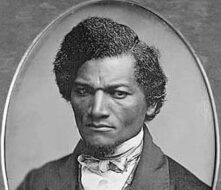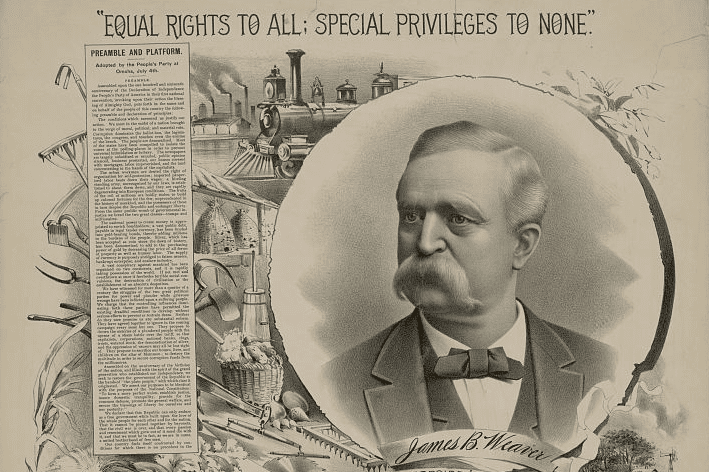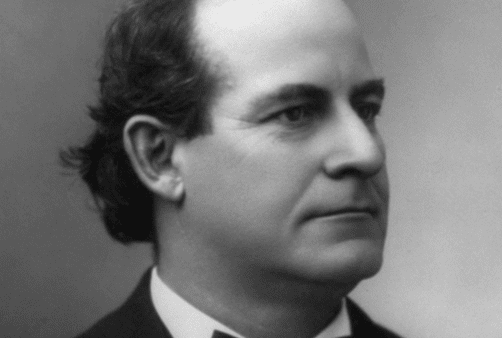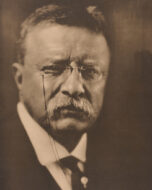


No related resources
Introduction
Frederick Douglass (1818–1895), a former slave, was the premier figure in abolitionist circles before the Civil War and a leading advocate for racial equality after it. His career in writing and oratory began in 1841, only two years after he escaped from slavery in Maryland, and lasted more than fifty years. During the years before the Civil War, Douglass advocated for an anti-slavery interpretation of the Constitution. After the Civil War, he saw any doubts about the Constitution’s position on slavery resolved through the 13th, 14th, and 15th amendments. Yet he saw clearly that changes in law, important as they were, were not enough to win genuine emancipation for freedmen. By the time Douglass helped to celebrate the twenty-first anniversary of emancipation in Washington D.C., many of the hard-won fruits of the war were in jeopardy. Black Codes had been passed and national efforts to roll them back met with limited success (See Colfax Massacre Reports). The Ku Klux Klan had arisen as a threat to the lives, property, and liberty of freedmen. The Supreme Court had given the Civil War amendments increasingly narrow interpretations (See Colfax Massacre Reports) that inhibited the national government’s ability to secure freedmen’s rights and safety. Northern troops had pulled out of the South with the election of Rutherford B. Hayes (1876). Afterwards, a new segregation of the races, enforced through law and opinion, arose across the South.
The title of Douglass’s speech lamenting these developments pointedly alludes to Abraham Lincoln’s “House Divided” speech in 1858, in which Lincoln predicted that the government of the United States could not endure “half slave and half free.” That Douglass could entertain the same thought 35 years after Lincoln’s speech and 21 years after the emancipation of slaves in Washington D.C. is testimony to how far America still had to go if it were to live up to its promise of equal liberty for all.
Source: Frederick Douglass, Address by Hon. Frederick Douglass, Delivered in the Congregational Church, Washington, D.C., on the Twenty-first Anniversary of Emancipation in the District of Columbia, 1883, Library of Congress, Manuscript/Mixed Material, https://goo.gl/1D9vLq.
. . . At the outset, as an old watchman on the walls of liberty, eagerly scanning the social and political horizon, you naturally ask me, What of the night?[1] It is easy to break forth in joy and thanksgiving for Emancipation in the District of Columbia. It is easy to call up the noble sentiments and the startling events which made that measure possible. It is easy to trace the footsteps of the Negro in the past, marked as they are all the way along with blood. But the present occasion calls for something more. How stands the Negro today? What are the relations subsisting between him and the powerful people among whom he lives, moves, and has his being? What is the outlook, and what is his probable future?
You will readily perceive that I have raised more questions than I shall be able for the present to answer. My general response to these inquiries is a mixed one. The sky of the American Negro is dark, but not rayless; it is stormy, but not cheerless. The grand old party of liberty, union, and progress, which has been his reliance and refuge so long, though less cohesive and strong than it once was, is still a power and has a future.[2] . . . Peace with the old master class has been war to the Negro. As the one has risen, the other has fallen. The reaction has been sudden, marked, and violent. It has swept the Negro from all the legislative halls of the Southern States, and from those of the Congress of the United States. It has, in many cases, driven him from the ballot box and the jury box. The situation has much in it for serious thought, but nothing to cause despair. . . .
. . .Time and events which have done so much for us in the past, will, I trust, not do less for us in the future. The moral government of the universe is on our side, and cooperates, with all honest efforts, to lift up the downtrodden and oppressed in all lands, whether the oppressed be white or black. In whatever else the Negro may have been a failure, he has, in one respect, been a marked and brilliant success. He has managed by one means or another to make himself one of the most prominent and interesting figures that now attract and hold the attention of the world. . .
Men of all lands and languages make him a subject of profound thought and study. To the statesman and philosopher he is an object of intense curiosity. Men want to know more of his character, his qualities, his attainments, his mental possibilities, and his probable destiny. . . .
Great, however, as is his advantage at this point, he is not altogether fortunate after all, as to the manner in which his claims are canvassed. His misfortune is that few men are qualified to discuss him candidly and impartially.
It was so in time of slavery, and it is so now. Then, the cause was interest, now, the cause is pride and prejudice. Then, the cause was property. He was then worth twenty hundred millions to his owner. He is now worth uncounted millions to himself. While a slave there was a mountain of gold on his breast to keep him down – now that he is free there is a mountain of prejudice to hold him down.
Let any man now claim for the Negro, or worse still, let the Negro now claim for himself, any right, privilege or immunity which has hitherto been denied him by law or custom, and he will at once open a fountain of bitterness, and call forth overwhelming wrath.
It is his sad lot to live in a land where all presumptions are arrayed against him, unless we except the presumption of inferiority and worthlessness. If his course is downward, he meets very little resistance, but if upward, his way is disputed at every turn of the road. If he comes in rags and in wretchedness, he answers the public demand for a Negro, and provokes no anger, though he may provoke derision, but if he presumes to be a gentleman and a scholar, he is then entirely out of his place. . . . If he offers himself to a builder as a mechanic, to a client as a lawyer, to a patient as a physician, to a university as a professor, or to a department as a clerk, no matter what may be his ability or his attainment, there is a presumption based upon his color or his previous condition, of incompetency, and if he succeeds at all, he has to do so against this most discouraging presumption.
It is a real calamity, in this country, for any man, guilty or not guilty, to be accused of crime, but it is an incomparably greater calamity for any colored man to be so accused. Justice is often painted with bandaged eyes. She is described in forensic eloquence, as utterly blind to wealth or poverty, high or low, white or black, but a mask of iron, however thick, could never blind American justice, when a black man happens to be on trial. Here, even more than elsewhere, he will find all presumptions of law and evidence against him. . . .
. . . In many parts of our common country, the action of courts and juries is entirely too slow for the impetuosity of the people’s justice. When the black man is accused, the mob takes the law into its own hands, and whips, shoots, stabs, hangs or burns the accused, simply upon the allegation or suspicion of crime. Of such proceedings Southern papers are full. A crime almost unknown [on the part of] the colored man in the time of slavery seems now, from report, the most common. I do not believe these reports [of black crimes]. There are too many reasons for trumping up such charges.
Another feature of the situation is, that this mob violence is seldom rebuked by the press and the pulpit, in its immediate neighborhood, because the public opinion, which sustains and makes possible such outrages, intimidates both press and pulpit. Besides, nobody expects that those who participate in such mob violence will ever be held answerable to the law, and punished. . . . The situation, my colored fellow citizens, is discouraging, but with all its hardships, and horrors, I am neither desperate nor despairing as to the future.
One ground of hope is found in the fact referred to in the beginning, and that is, the discussion concerning the Negro still goes on.
The country in which we live is happily governed by ideas as well as by laws, and no black man need despair while there is an audible and earnest assertion of justice and right on his behalf. He may be riddled with bullets, or roasted over a slow fire by the mob, but his cause cannot be shot or burned or otherwise destroyed. Like the impalpable ghost of the murdered Hamlet, it is immortal. All talk of its being a dead issue is a mistake. It may for a time be buried, but it is not dead. Tariffs, free trade, civil service, and river and harbor bills, may for a time cover it, but it will rise again, and again, and again, with increased life and vigor. Every year adds to the black man’s numbers. Every year adds to his wealth and to his intelligence. These will speak for him. . . .
. . . Without putting my head to the ground, I can even now hear the anxious inquiry as to when this discussion of the Negro will cease. When will he cease to be a bone of contention between the two great parties? Speaking for myself . . . I long to see the Negro utterly out of the whirlpool of angry political debate. . . . I want the whole American people to unite with the sentiment of their greatest captain, U.S. Grant, and say with him on this subject “Let us have peace.”[3] . . . But it is idle, utterly idle to dream of peace anywhere in this world, while any part of the human family are the victims of marked injustice and oppression. . . .
Fellow citizens, the present hour is full of admonition and warning. . . .
No matter what the Democratic party may say; no matter what the old master class of the South may say; no matter what the Supreme Court of the United States may say,[4] the fact is beyond question that the loyal American people, in view of the services of the Negro in the national hour of peril, meant to make him, in good faith and according to the letter and spirit of the Constitution of the United States, a full and complete American citizen.
The amendments to the Constitution of the United States mean this,[5] or they are a cruel, scandalous and colossal sham, and deserve to be so branded before the civilized world. What Abraham Lincoln said in respect of the United States is as true of the colored people as of the relations of those States.[6] They cannot remain half slave and half free. You must give them all or take from them all. Until this half-and-half condition is ended, there will be just ground of complaint. You will have an aggrieved class, and this discussion will go on. Until the public schools shall cease to be caste schools in every part of our country, this discussion will go on. Until the colored man’s pathway to the American ballot box, North and South, shall be as smooth and as safe as the same is for the white citizen, this discussion will go on. Until the colored man’s right to practice at the bar of our courts, and sit upon juries, shall be the universal law and practice of land, this discussion will go on. Until the courts of the country shall grant the colored man a fair trial and a just verdict, this discussion will go on. Until color shall cease to be a bar to equal participation in the offices and honors of the country, this discussion will go on. Until the trades-unions and the workshops of the country shall cease to proscribe the colored man and prevent his children from learning useful trades, this discussion will go on. Until the American people shall make character, and not color, the criterion of respectability, this discussion will go on.[7] . . .
. . .The rights of the Negro, as a man and a brother, began to be asserted with the earliest American Colonial history, and I derive hope from the fact, that the discussion still goes on, and the claims of the Negro rise higher and higher as the years roll by. Two hundred years of discussion has abated no jot of its power or its vitality. Behind it we have a great cloud of witnesses,[8] going back to the beginning of our country and to the very foundation of our government. Our best men have given their voices and their votes on the right side of it, through all our generations. . . .
The first publication in assertion and vindication of any right of the Negro, of which I have any knowledge, was written more than two hundred years ago, by Rev. Morgan Godwin, a missionary of Virginia and Jamaica.[9] This was only a plea for the right of the Negro to baptism and church membership. The last publication of any considerable note, of which I have any knowledge, is a recent article in the Popular Science Monthly, by Professor Gilliam.[10] The distance and difference between these two publications, in point of time, gives us a gauge by which we may in good degree measure the progress of the Negro. The book of Godwin was published in 1680, and the article of Gilliam was published in 1883. The space in time between the two is not greater than the space in morals and enlightenment. The ground taken in respect to the Negro, in the one, is low. The ground taken in respect to the possibilities of the Negro, in the other, is so high as to be somewhat startling, not only to the white man, but also to the black man himself.
The book of Morgan Godwin is a literary curiosity and an ethical wonder.
I deem myself fortunate in being the owner of a copy of it. . . . [Dr. Godwin] very evidently was not a Negro worshiper, nor what in our day would be called an abolitionist. He proposed no disturbance of the relation of master and slave. On the contrary, he conceded the right of the master to own and control the body of the Negro, but insisted that the soul of the Negro belonged to the Lord. . . . [T]he ground taken in this book by Dr. Godwin was immensely important. It was, in fact, the starting point, the foundation of all the grand concession yet made to the claims, the character, the manhood and the dignity of the Negro. In the light of his present acknowledged position among men, here and elsewhere, a book to prove the Negro’s right to baptism seems ridiculous, but so it did not seem two hundred years ago. Baptism was then a vital and commanding question, one with which the moral and intellectual giants of that day were required to grapple.
The opposition to baptizing and admitting the Negro to membership in the Christian church, was serious, determined, and bitter. That ceremony was, in his case, opposed on many grounds, but especially upon three. First, the Negro’s unfitness for baptism; secondly, the nature of the ordinance itself; and thirdly, because it would disturb the relation of master and slave. The wily slaveholders of that day were sharp-eyed and keen scented, and snuffed danger from afar. . . .
They contended that this holy ordinance could only be properly administered to free and responsible agents, men, who, in all matters of moral conduct, could exercise the sacred right of choice; and this proposition was very easily defended. For, plainly enough, the Negro did not answer that description. The law of the land did not even know him as a person. He was simply a piece of property, an article of merchandise, marked and branded as such, and no more fitted to be admitted to the fellowship of the saints than horse, sheep or swine. . . .
. . . To thrust baptism and the church between the slave and his master was a dangerous interference with the absolute authority of the master. The slave-holders were always logical. When they assumed that slavery was right, they easily saw that everything inconsistent with slavery was wrong. . . . There was a more controlling motive for opposing baptism. Baptism had a legal as well as a religious significance. By the common law at that time, baptism was made a sufficient basis for a legal claim for emancipation.[11] . . .
For in that day of Christian simplicity, honest rules of Biblical interpretation were applied. The Bible was thought to mean just what it said. When a heathen ceased to be a heathen and became a Christian, he could no longer be held as a slave. Within the meaning of the accepted word of God it was the heathen, not the Christian, who was to be bought and sold, and held as bondman forever.
This fact stood like a roaring lion ready to tear and devour any Negro who sought the ordinance of baptism.
In the eyes of the wise and prudent of his times, Dr. Godwin was a dangerous man, a disturber of the peace of the church. . . .
In fact, when viewed relatively, low as was the ground assumed by this good man two hundred years ago, he was as far in advance of his times then as Charles Sumner was when he first took his seat in the United States Senate.[12] What baptism and church membership were for the Negro in the days of Godwin, the ballot and civil rights were for the Negro in the days of Sumner. . . .
. . . Friends and fellow-citizens, in conclusion I return to the point from which I started, namely: What is to be the future of the colored people of this country? Some change in their condition seems to be looked for by thoughtful men everywhere; but what that change will be, no one yet has been able with certainty to predict.
Three different solutions to this difficult problem have been given and adopted by different classes of the American people. 1. Colonization in Africa; 2. Extinction through poverty, disease and death; 3. Assimilation and unification with the great body of the American people. . . .
. . . We neither know the evil nor the good which may be in store for us. Twenty-five years ago the system of slavery seemed impregnable. Cotton was king and the civilized world acknowledged his sway.[13] Twenty-five years ago, no man could have foreseen that in less than ten years from that time no master would wield a lash and no slave would clank a chain in the United States. Who at that time dreamed that Negroes would ever be seen as we have seen them today marching through the streets of this superb city, the Capital of this great Nation with eagles on their buttons, muskets on their shoulders and swords by their sides, timing their high footsteps to the Star-Spangled Banner and the Red, White and Blue? Who at that time dreamed that colored men would ever sit in the House of Representatives and in the Senate of the United States?[14]
With a knowledge of the events of the last score of years, with a knowledge of the sudden and startling changes which have already come to pass, I am not prepared to say what the future will be.
But I will say that I do not look for colonization either in or out of the United States. Africa is too far off, even if we desired to go there, which we do not. The navy of all the world would not be sufficient to remove our natural increase to that far off country. Removal to any of the territories is out of question.
We have no business to put ourselves before the bayonet of the white race. We have seen the fate of the Indian. As to extinction, the prospect in that direction has been greatly clouded by the census just taken, in which it is seen that our increase is ten per cent greater than that of the white people of the South.
There is but one destiny, it seems to me, left for us, and that is to make ourselves and be made by others a part of the American people in every sense of the word. Assimilation and not isolation is our true policy and our natural destiny. Unification for us is life: separation is death. We cannot afford to set up for ourselves a separate political party, or adopt for ourselves a political creed apart from the rest of our fellow citizens. Our own interests will be subserved by a generous care for the interests of the Nation at large. All the political, social and literary forces around us tend to unification.
I am the more inclined to accept this solution because I have seen the steps already taken in that direction. The American people have their prejudices, but they have other qualities as well. They easily adapt themselves to inevitable conditions, and all their tendency is to progress, enlightenment and to the universal.
It’s comin’ yet for a’ that,
That man to man the world o’er
Shall brothers be for a’ that.[15]
- 1. Isaiah 21: 11
- 2. Douglass refers to the Republican party and its eventual abandonment of Reconstruction. This led to the revival of the old master class of the South. See Document 24.
- 3. Grant made this remark in his speech accepting the Republican Party’s nomination for the Presidency in 1868.
- 4. Douglass refers to Supreme Court decisions (e.g. Cruikshank v. United States, and the Slaughter House cases) in the 1870s that restricted the reach of the federal government in enforcing laws protective of African Americans.
- 5. Douglass refers to the 13th, 14th, and 15th amendments.
- 6. Douglass refers to Lincoln’s House Divided speech, which Lincoln gave upon accepting the nomination as the Illinois Republican senatorial candidate in 1858.
- 7. Compare Martin Luther King’s remark in his “I Have a Dream” speech at the Lincoln memorial August 28, 1963: “I have a dream that my four little children will one day live in a nation where they will not be judged by the color of their skin but by the content of their character.”
- 8. Hebrews 12:1
- 9. Morgan Godwin (1640 circa – 1690) was an Anglican missionary and author of The Negro’s and Indians Advocate, Suing For Their Admission into the Church, published in 1680.
- 10. Prof. E.W. Gilliam penned an article entitled “The African in the United States,” (February 22, 1883) expressing worries that America was yielding to a black supremacy based on the natural birth rates among freedmen.
- 11. This changed shortly after Godwin published his tract. See the Virginia Slave Code.
- 12. Charles Sumner (1811–1874) was a leading anti-slavery politician.
- 13. See the “Mud-Sill” speech of James Henry Hammond.
- 14. Following the Civil War, a number of African Americans served in Congress. Following the end of Reconstruction in 1877, southern states began revising their constitutions and passing laws to prevent African Americans from voting (see Document 29). The last African American representative from a former Confederate state left Congress in 1901. No African American served in Congress during the ensuing 28 years. The next African Americans from former Confederate states were elected to Congress in 1973.
- 15. From Robert Burns, “A Man’s a Man for A’ That” (1795). See https://goo.gl/UYLYUT.

Conversation-based seminars for collegial PD, one-day and multi-day seminars, graduate credit seminars (MA degree), online and in-person.

































































































